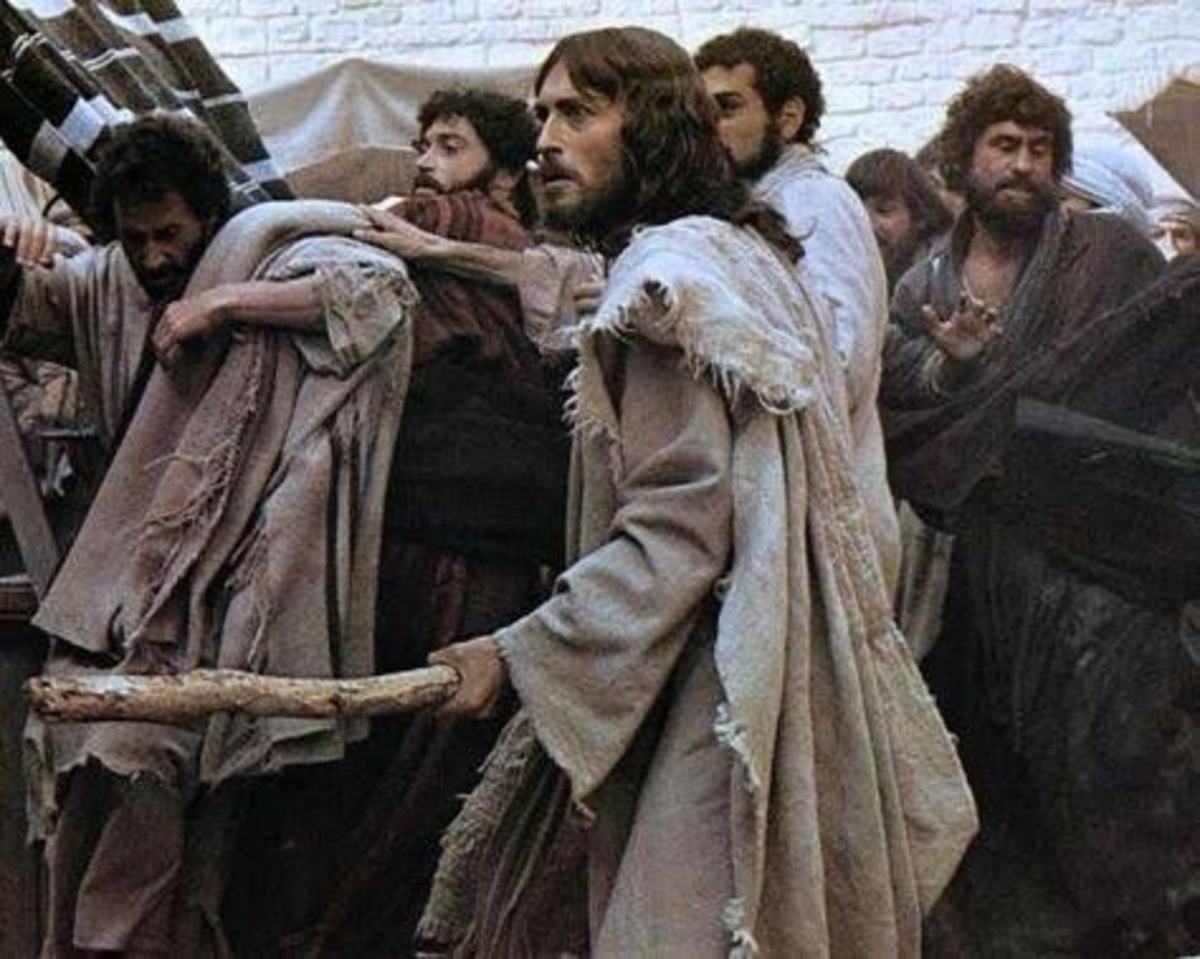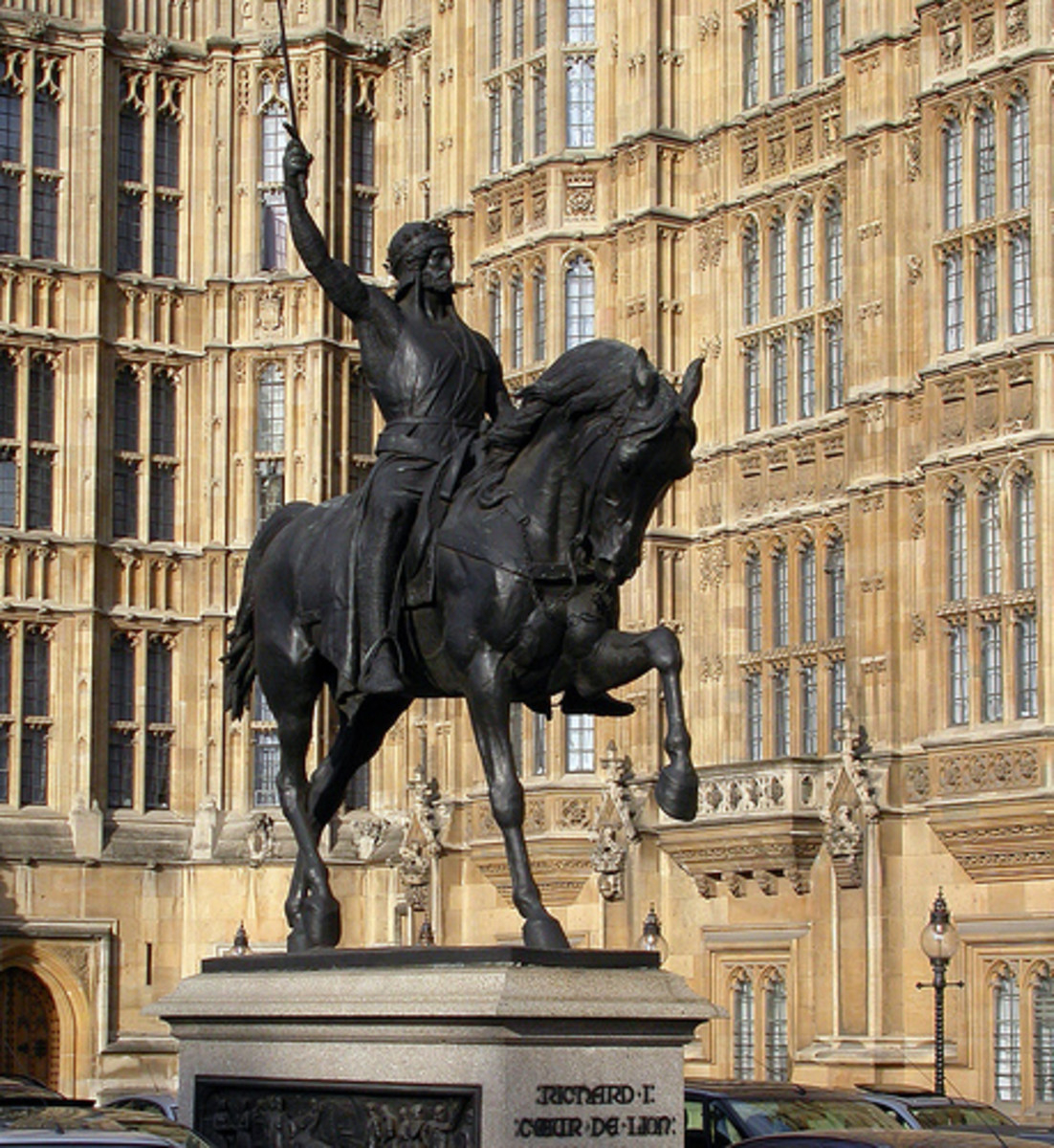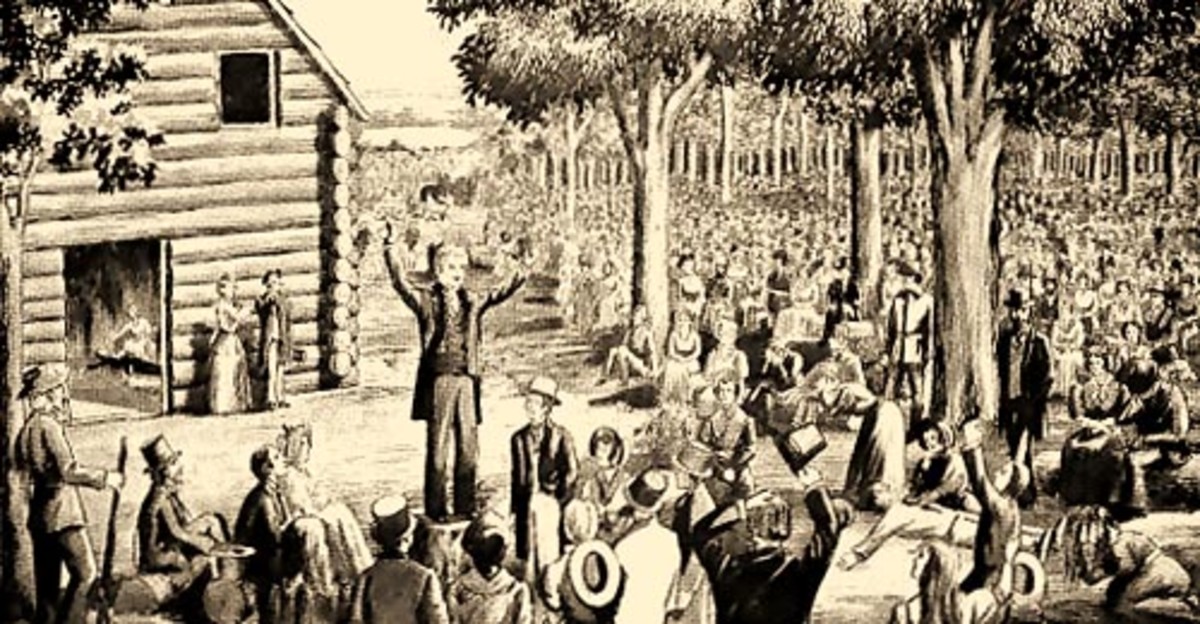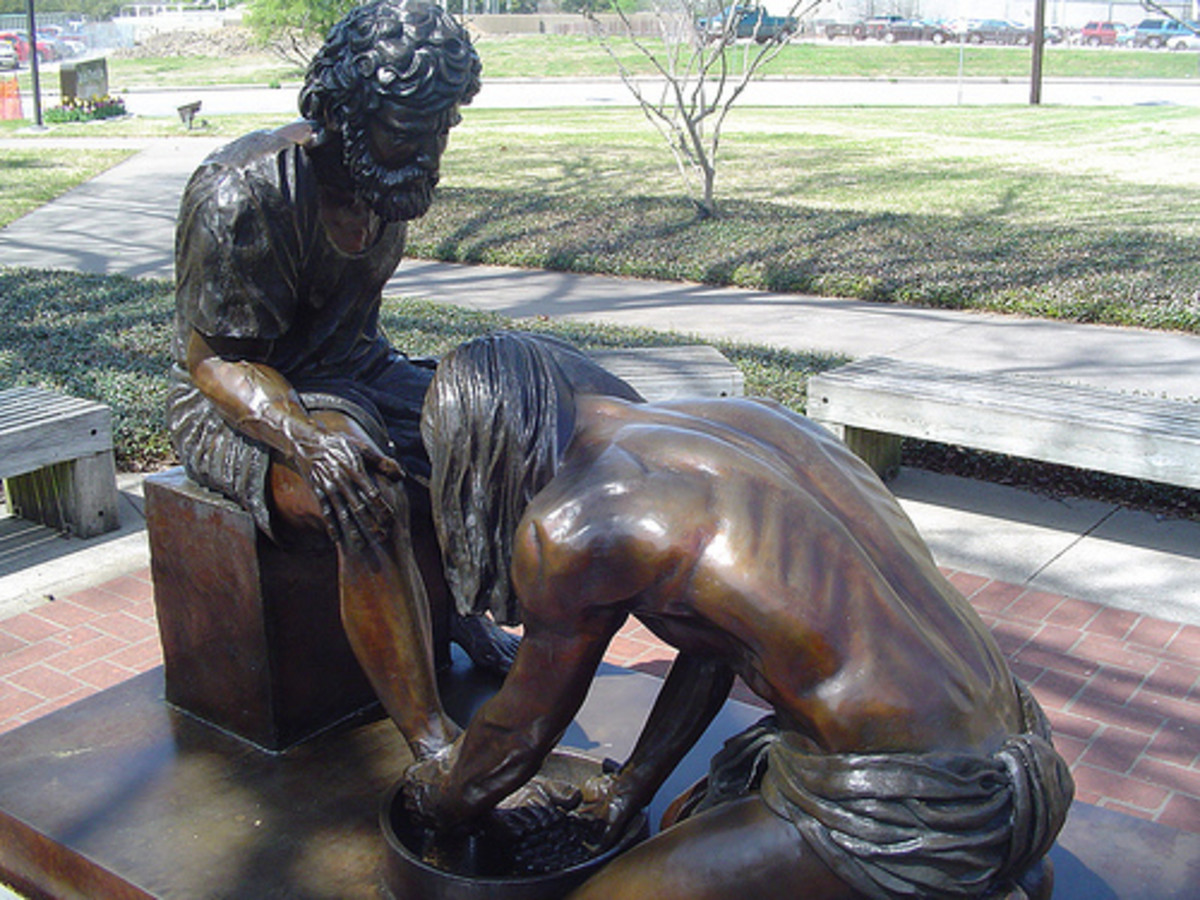Jesus as a Liberation Leader
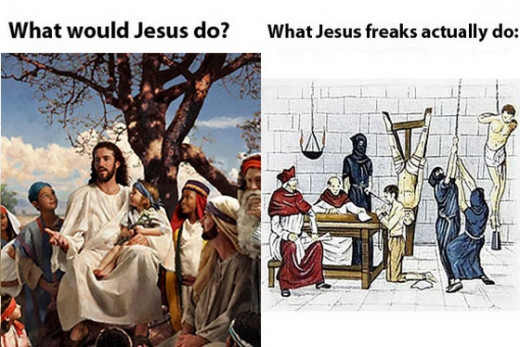
Despite Oppression all Around, Jesus' Message Prevails, But it May Not Be What You Think!
To answer the question of Jesus' real role in history, we look across the available resources to dig out the truth. One of the first things we learn in the investigation is that Jesus had 70 people aside from the twelve apostles in all, going out two by two to spread the message everywhere they travelled. Thus we learn that he was an organizer who stated that the labourer is worthy of his hire (1). Further, within the message is the directive to take neither purse nor script as this suggests that there was such a wide network of support, these 70 would be able to live without carrying everything they required from place to place. The twelve apostles remained with Jesus for the most part, presumably to help with administration, education and organizing. In addition, there was a feeding and healing ministry. Both were necessary because of the brutal conditions imposed by Roman occupation. Here is an instance of some of the truth getting through, even though Paul and his scriptorium screened everything.
In another instance, we learn that there were others in Judea going about preaching and healing. The specific reference is about the dealing with children and the casting out of demons. In Jesus' time of ministry, the apostles encountered others healing and working miracles. The story ads that the apostles forbade them from doing so, but Jesus retorts that they should have permitted the work because anyone who is doing the same kind of thing in the name of Christ is for Christ and not against Christ. In other words, Jesus is promoting solidarity between groups who work the same cause and fight the same enemies. He ads that anyone who offends the children would be better off if a millstone where tied about his neck and they be cast into the sea. (2) Demons in this instance can be a reference to Roman proxies who are doing the dirty work of Rome in its imperialist domination. Demons can also refer to a condition we now call Post Traumatic Stress Disorder (PTSD) that is common in those who suffer extreme brutality, such as during war, whether giving or receiving the same. Specifically, what is referred to is the teaching of children and we have a strong parallel in America where first nations children were ripped away from their parents and culture in order to absorb the teaching and propaganda of the invaders. Conditions in this context were brutal and kindness was scarce. Thus, Jesus knew the extreme importance of being kind to children and teaching them in that context and anyone working in solidarity with that principle, teaching and being kind likewise, was for the cause and not against it. In the heady confusion of that era, with misinformation rife as it is now, it is easy to see why some would commit errant actions that would have to be corrected. Contrary to the axiom of get them early, treat them rough and tell them nothing; Jesus offered an alternative message as did others who did likewise to which the apostles referred. Jesus message was one of kindness and telling the truth, which extended to all of their needs. Indeed, the statement of giving a glass of cold water even in the name of an apostle alone was meritorious. In this context, Jesus was no sectarian, but where there was agreement between different groups, that was enough, provided that the goal was identical. The apostles thought that there was a potential enemy, but there is an axiom that the enemy of my enemy is my friend. Jesus demonstrated the thorough understanding of these political ideas, giving other “miracle workers” a nod of approval. The nature of miracles will be the topic of another chapter.
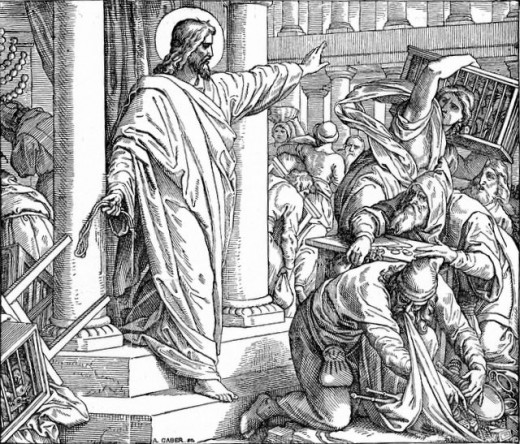
In another instance, in line with the Torah, Jesus condemned the practice of the money changers in the temple. Money changers were in contradiction to the Torah which forbids the lending of money at interest-usury or with a transaction fee. Jesus called this theft and dealt harshly with money changers (3, 4, 5, 6). After this, the account varies with him healing the sick and dealing with the scribes. The important idea here is that this particular incident is described in all four of the Gospels, a rare thing indeed, signifying the importance of the idea. Elsewhere we learn that no one can serve two masters (7, 8), which is related. There are other instances dealing with money as well, such as the coin with the image of Caesar and with tax collectors.
As a liberator, Jesus began his ministry according to his pronouncement in the temple during a jubilee year. Citing the Jewish calendar, which duly noted the seven year cycle of seventh year Sabbaths – jubilees from the creation of Adam, we find that 26 AD and 33 AD come up as jubilee years. This is equated with the “acceptable year of the Lord” by Jesus in the temple in the early part of his ministry. Thus, 33 AD is too late and the year 26 AD marks the beginning of his ministry in the temple during a jubilee year. Thus he ministered from 26 AD through to 29 AD. Jesus called for the setting free of prisoners, to tell the good news to the poor, to heal the brokenhearted, deliverance to the captives, giving sight to the blind, set those who are bruised free, forgiveness of debts and the like (9). These calls are directly in line with the Torah, the law of Judea, and are the first part of our Old Testament. Again, Jesus points out that he came to fulfil the law and not to end it (10). This fulfilment included the jubilee concept of the release of slaves, captives, prisoners, debts and holdings. Jesus was in essence among others, a liberator both for Judea and non-Judea. As Rome had no intention of releasing slaves or prisoners without a battle, as was proven in the past with the Spartacus slave revolt, then Jesus along with others had to insist, protest and revolt in a bid to keep the jubilee year conditions. Rome and the traditional Jews were at loggerheads over differing cultures and ideas!

Jesus ministered to the outcasts of Judea. These included tax collectors for Rome, prostitutes, drunks, the sick, the lame, the poor, prisoners, slaves and the like. He was accused of the same crimes by association, such as being licentious, a drunkard and debauched. He was even accused of casting out demons by demonic power. Jesus was no snob, but dealt with those who had a self-important, high and mighty attitude by stating in critique that those who were ill needed healing while those who were healthy did not (Matthew 11:19,20). Then there is the famous story of the woman taken in adultery, which the Jehovah's Witnesses have seen fit to remove from their Bible (John 8:1-11). The important message here is that no one is worthy to kill another over a sin, for none are without sin. Jesus forgave the alleged sin and told the woman to go and sin no more. These kinds of actions won Jesus a lot of support and this is why the Romans and Jewish puppets regarded him as a threat to the imperialist order and cushy positions therein. Jesus was certainly not alone and both Rome and collaborating Judean authorities had their hands full as history ultimately proved in 66 to 70 AD. At heart, Jesus was more political than religious and the charges against him, though identified as religious are in fact political. He was not alone in his quest, nor was he the first or the last of the liberators. Ultimately, due to the actions of insurgents against Rome, Judea was laid waste and the population scattered. The records of the history of the region were burned when Jerusalem was sacked and the temple burned. This is where much of the historic record disappeared and we are left to reconstruct the past.
Let us now turn to the Koran that has not been tainted by the application of Pauline and pagan doctrines. Jesus in the New Testament repeatedly refers to himself as the son of man. Paul superimposes that Jesus is the son of God and this idea has been promoted in almost the entire New Testament. Jesus stated, recapitulating the Old Testament “Know ye not that ye are all gods? (11, 12)” He also stated that the “Kingdom of God is within you (13).” In short, we have a directive to manifest the kingdom from within ourselves and that it does not come by watching and waiting. The Koran brings things into focus when we read Sura 19:verses 20,34; Sura 5:section 16 verse 119; Sura 5: verses 72-73, 5: verse 75; Sura 4: verse 171 and many more (14). The Koran goes a long way to erase the damage created by the Pauline perversions and it is not alone. It has been less polluted by politics over many translations. Jesus is placed into proper focus with the further statement on the part of Paul nonetheless despite obscuration elsewhere when he states that we are to work out our salvation with fear and trembling (15) in contradiction to other statements that salvation is not from ourselves but by faith in Jesus Christ whom he identifies as the living, resurrected from the dead, son of God (16, 17, 18). We are told that salvation is by faith and not of works (19). James on the other hand says that faith is proven by works and that the two must be linked and are co-dependant (20). In Revelation we read about the church of Thyatira concerning works and faith (21). This church, as we will explain later, is non other than the Catholic church that ruled from 538 through 1798, a period of 1,260 years. Given all of this we can say that Jesus, and others like him, of which we can account of at least 85 in his era alone, demonstrated by their lives and actions, how we are to affect our salvation and realize the kingdom of God on earth. When put to the task and question, Jesus stated that his kingdom was not of this world (22). From the Greek translation, we can discover that the word world is variously translated from eon-age, the physical planet, system of things, principalities and civilization or civil society. In context, Jesus was referring to the Roman imperialists and their puppets in Judea, with whom he did not identify, nor align himself. In a few words, when he says “My kingdom is not of this world”, it means that he is not identifying with Roman imperialism and its collaborators. His is a different world view from the one that dominated at the time. Curiously, Paul affirms this very idea in Ephesians 6:12. Today, the struggle of ideas runs the gamut from democracy, fascism, socialism, communism, anarchy, monarchy, military dictatorship, theocracy and others.
What is the Real Gospel? The Controversy!
James, the brother of Jesus according to some sources, worked along side the apostle Peter, upon whom Jesus placed his trust to carry on the true gathering after he departed. When we read the epistle of James it immediately becomes apparent that he was aware of the class divide between rich and poor and the true nature of the struggle. Of all of Jesus' followers, he was the most plainly politically radical (23). Saul – Paul sought him out as did Rome with the intent to assassinate him. This plan almost succeeded with James narrowly escaping. This is strong proof of James' and Jesus' radical lean and class consciousness. Both sought to throw off the shackles of Rome or attempt to convert them from their ways. Paul on the other hand used trickery and subterfuge in order to conquer the Jesus movement. What resulted was a splitting asunder of the fervent followers from those who were not as commuted. With the advent of Paul, a second gathering or church was born, one that included pagan ideas and mystified the ideas of the original movement. Many found the Pauline doctrine easier to follow, especially if they were wealthy and powerful.
When finally brought to Roman justice, Jesus was scourged and this punishment could have killed him, Others who suffered this horrific punishment, often did not survive it. He survived that and then was nailed to a stake or tree. The story goes that he survived this too, showing that he had to be one tough man. As a result, a myth mushroomed around him and Christianity was ignited and eventually took over Rome itself, though in a twisted form, thanks to Paul. Outside of the New Testament and the Nag Hamadi finds, there is little commentary on Jesus or his direct followers and even little commentary on Paul. But something dramatic must have occurred in order to provoke the start of an idea that would eventually spread around the world. Account of persecution of Christians was certainly noted in Rome decades after Jesus and Paul. Like Jesus, Mohammed was also heavily persecuted in his lifetime and often got away by the skin of his teeth. In at least one occasion, Jesus was warned by the Pharisees that he had better flee to safety as Herod's minions were on to him and were about to strike. Ultimately, Jesus only escaped through extreme ordeal.
References:\
-
Luke 10:1–8 (NKJV)
-
Mark 36:39-42
-
John 2:13-16
-
Matthew 21:12-14
-
Mark 11:16-18
-
Luke 19:45-47
-
Matthew 6:24
-
Luke 16:13
-
Luke 4:15
-
Matthew 5:17
-
Psalm 82:6
-
John 10:34-36
-
Luke 17:21
-
Philippians 2:12
-
I Corinthians 15:12
-
Philippians 3:10
-
1 Peter 1:3
-
2 Timothy 3:15
-
James 2:14,22,24
-
Revelation 2:18-20
-
John 18:36
-
James 5:1-6


